OVER THE WEEKEND I had the luxury of seeing Django Unchained, Quentin Tarantino’s slavery-centered revenge fantasy. Like everything the gore-obsessed culture monger has produced, from Pulp Fiction to Kill Bill, I found myself wrapped up in a narrative so inventive I was in no time cheering along as the taskmasters bled out. I’ve had long conversations with more film-savvy friends on Mr. Tarantino’s artistic merits. Sure, some of them are enamored, but others find him too liberal with his tendency to borrow—more of a master of post-modern pastiche than an authentic auteur, while posing as the latter. I can’t say I don’t sympathize. As someone interested in authenticity (in literature, especially), I can’t fault those who take Tarantino’s obsession with Kung Fu movies, Spaghetti Westerns, and scene stalking to task. Still, with each release I find myself unflinchingly in awe; whether or not I’m being spoon-fed what’s already been done, Tarantino’s films accomplish the goal of playing with a viewer’s perception of past and present. He does wonders with rendering violence surreal, while, of course, polarizing the hell out of his audience.
Never has this been truer than with his last two films, where he opened up a real can of worms. You’ve got to think he expected this, with both Inglourious Basterds and Django Unchained tackling some of the most horrific tragedies in human history. But whether he did or not doesn’t matter now. The backlash he received hasn’t hindered his success. If anything, it’s bolstered his image as a provocateur, especially in conversations over artistic license, on whether or not he has the right to tell other people’s stories. While Basterds was enjoyed by many Americans and lauded in Tel Aviv, a sizeable and thoughtful percentage of the Jewish American community was offended by the film’s violence, revenge themes, and historical liberties. Though my feelings towards the film were mainly positive, the main argument I noticed being leveraged against it, as with Django, was that the history being represented belongs to those affected by it, and if you take it out of those peoples’ hands, you have the tendency to mess with cultural ownership.
I’m not unsympathetic to this line of thought. In fact, I’m a proponent of using immense caution when appropriating cultural narratives that are foreign to one’s own, especially if those narratives involve passing judgment upon those on the receiving end. This is the issue I had with The Reader– a movie, written by a non-Jew, about the moral gravity of the catastrophe that befell the Jewish people. A fairly tepid screenplay, it proceeded to make tacit judgments upon the prevailing narrative vis à vis the Holocaust, reinforcing, through a muted humanization of a Nazi death-camp guard and her sexual immaturity, that Jews are unwarranted in their characterization of concentration camp officers as utterly cruel and unfeeling, a murky subject considering the lopsided reality of the Nazi genocide. This is part of the reason the film was so confused in its purpose, leaving many cold, because–as elegantly stated by Manohla Dargis of The New York Times–it was “about making the audience feel good about a historical catastrophe that grows fainter with each new tasteful interpolation.”
Other Holocaust related films have skirted this line in varying shades, whether in the representation, or underrepresentation, of Jewish characters in their own narrative. But somehow, when I saw Inglorious Basterds, I was able to put every aspect of the political and moral out of mind. I didn’t worry for a moment that the film was offering a seminal verdict upon the fate of Jews during the Holocaust, nor did I feel as if it was attempting to lodge comment or complaint upon the state of modern Jewish identity, its relationship to Israel, and the fraught nature of modern anti-Semitism. If anything, the film—as quoted by Eli Roth—was “Kosher porn,” playing into jejune desires for vindication, not by anesthetizing them or pretending they can be erased. The thematic through-line I felt while watching the Bear Jew click his way from a tunnel with a baseball bat wasn’t a call for Hebrews to forget, bury, or even rise above their generally miserable history, but rather to take a few solid shots at their perpetrators, and feel a little less like victims. It was more like a video game in the experiential sense, an exercise in schadenfreude. Something as simple as someone giving you a joystick and saying, “Hey, young American Jew, you know those Nazis that sent bubbe and zayde to the ovens? As opposed to playing out that story again, why don’t spend a couple hours blowing the heads off the fuckers who were responsible. It’ll be good for you.” No one thinks the Nazis are going to rise up again (at least not under the title of Nazi—hatred tends to change faces for practical purposes). And no one is being trained to kill or destroy. Going to a movie like Inglorious Basterds entertains a libidinal urge to rectify what is no longer rectifiable. It’s a matter of the classic conundrum: “If you could go back in time and exact furious vengeance on a bunch of Nazis to save your ancestors from being flayed alive, would you? And more importantly, how would you?”
There is an obvious “eye for an eye” mentality to be found in Tarantino’s filmmaking. This can make people uncomfortable. A conservative mind might look upon the director’s penchant for diversity, his incorporation of African-American, Jewish, Latino, and Asian perspectives into his work as more than mere tropes, as threatening. The right’s reaction to Django Unchained, for instance, was particularly telling, being that they couldn’t overlook the hyperbolic, a-thematic nature of the film, construing it instead as a call for black libel against Christian whites. The far left, being increasingly unable to see cultural representation outside of a very rigid box, also found itself in the position of coming out against Tarantino’s narrative of victim overcoming oppressor.
Though the political and socially conservative right is easy to lampoon here, as racism is just part of the party platform these days, I find the left’s reaction to Django far more interesting. Some prominent black filmmakers and intellectuals, including Ishmael Reed and Spike Lee, have voiced complaint against the film. I can’t, and won’t, contradict Reed’s feelings here, as I don’t know too much about him or his views historically, but Spike Lee’s refusal to see the film, at least in my opinion, seems absolutely absurd. Apart from the fact that a lot of Lee’s films are, frankly, hit and miss, he has a noted history of depicting ethnic and racial groups in unsavory ways. Jews, specifically. Although he cursed Quentin Tarantino’s employment of artistic license to stage a campy slave revenge narrative, in Mo’ Better Blues, he had no problem using that very same license to depict two characters, Josh and Moe Flatbush, as bloodsucking Shylocks. And The Inside Man—which I actually enjoyed—was nothing more than a Jewish revenge fantasy in itself, employing another culture’s history to exact grand modern comeuppance upon a banker who accepted starter money from the Nazis. If Spike Lee were to follow the same rules he espouses against his contemporaries, then he would find himself extremely limited in his repertoire. Not to say that he can’t or shouldn’t feel uncomfortable with Tarantino’s film, but he should definitely examine his own propensity to represent others in the same way.
This is all to say that Django Unchained should be heavily scrutinized. Though I enjoyed both of Tarantino’s recent films, I was happy to read counterarguments. Jeffrey Goldberg at the Atlantic took his usual moderate sensibility to Inglorious Basterds: “Given the chance, of course, I would still shoot Mengele in the face. That would be a moral necessity. But I wouldn’t carve a swastika into his forehead. That just doesn’t sound like the Jewish thing to do.” I found this to be an incredibly valid viewpoint, or at least one far more preferable than Christopher Hitchens’ (may he rest in peace), when saying that watching the film was like “sitting in the dark having a great pot of warm piss emptied very slowly over your head.” Returning to Goldberg, I get the idea that even if you remove artistic license from the argument, people will walk away from a Tarantino movie with a different idea than the one the director hoped to convey, an idea that wouldn’t necessarily be espoused by the people being depicted on screen, either. Roxanne Gay explored this sentiment beautifully in her recent Buzz Feed essay on watching Django Unchained in a rural town. I thought this part here was particularly right on: “From the start the audience around me laughed, quite heartily. What was disconcerting was how often they laughed at the wrong times. Some of the laughter was nervous tittering during the first instances when the N-word was bandied about. They laughed when Stephen asked Calvin Candie if he was going to let ‘that nigger,’ Django, sleep in the master’s house. They laughed when Django told King Schultz people were staring because, ‘they ain’t never seen a nigger on no horse.’ The more the word was used, the funnier it seemed to become for the audience.”
Audience perception is definitely worth considering, especially when you’re working with supercharged elements like blacks killing slave-holding whites and Jews massacring Germans Nazis. People are wont to come out of a viewing with warped ideas on a minority’s place in history. Many Jews don’t want to be seen as having a lust for blood, especially with the situation in the Middle East and anti-Semitism’s increasing institutionalization outside of the United States. I obviously can’t speak for African Americans, but I do know, from the experience of friends, colleagues, and those magical things called books, that perception of violence in the black community by whites is something that still plays itself out in modern day America.
Another question to ask in this context is whether or not Quentin Tarantino’s revenge fantasies are really making up or changing anyone’s mind? Perhaps naively I happen to believe that prejudice begins with ignorance, and tends to thrive independent of knowledge to the contrary. The anti-Semites I’ve met, anyway, aren’t necessarily deprived of resources, and have the ability to access large amounts of information that could curtail their hatred, but instead choose to avoid it in favor of conspiracy literature. I don’t think it’s very different with anti-black racism, as many are weaned on hatred in the crib, rather than developing it later in life. It’s unlikely that someone like Quentin Tarantino is going to be changing many attitudes that haven’t already been instilled from the get-go. He is a fantasist more than anything, and isn’t going to have about just as much luck with academics looking for absolution as he would with racists looking for vindication. Also, let’s just think for a moment what would happen if an African-American would have directed Django Unchained, or for that matter, a Jew would have directed Inglorious Basterds? I can’t imagine anything good would have come of it. In fact, the product itself might have flown beneath the popularity radar, remaining something for consumption within the respective communities, as opposed to society at large. I’m not sure if traumatized peoples would even be able to exact such narratives in the same way (check out this piece about Tarantino and Reginald Hudlin’s feelings towards Roots). If anything, the horror of their pasts would make it harder to employ nuance. It’s safe to bet that if a Jew had directed Inglorious Basterds it would have caused a much greater uproar in both the Jewish community and the film going community at large. An absolute shanda fur die goy. I can’t even imagine what would happen with the African-American alternative on Fox News. Can you?
The question of artistic license will continue to remain a heated one as society explores the parameters of political correctness in the 21st century. But it’s worth thinking about whether or not creative work that represents a culture other than the creator’s is worthwhile as long as it comes from a place of appreciation. If representation comes from a place of distaste—which it often does—then condemnation will follow. One of the main American missions of the 21st century, however, seems to deal with encouraging people to understand each other’s histories, reinforce co-existence, and seek out cultural exchange. Should we be surprised that films like Inglorious Basterds and Django Unchained are what emerge from this neoteric milieu? Tarantino, as he recounts in this NPR Fresh Air interview, grew up a student of multiculturalism by default of his upbringing. The fact that he would give enough of a fuck to depict victims as heroes who will never be wronged again gives me a shiver of hope down my spine. It makes me think that mainstream culture is branching out, that it’s becoming popular, even fun, for the once meek to take pride in their newfound power. Also, let’s not forget that Tarantino’s primary outlook on cinema has a lot to do with what’s ‘cool’ or ‘badass,’ not what’s ‘offensive.’ What does Tarantino love? Kung Fu movies, Spaghetti Westerns, Blaxploitation. All of which incorporate a lone hero, a paragon of narcissism, righting historical wrongs, avenging lost honor, or saving a town/polity from corruption. People don’t freak out over Abraham Lincoln Vampire Hunter’s depiction of history, even though it’s just as fantastical as Inglorious Basterds in many senses. And perhaps that is the director’s greatest accomplishment. By creating controversy almost unwittingly, by braving the pinnacle of cool, he leaves his viewership to set the stage for discussion. At the end of the day, he’s a guy who likes to like culture on the screen, and whether or not that’s the politically correct thing to do, you can argue he’s damned good at doing so.

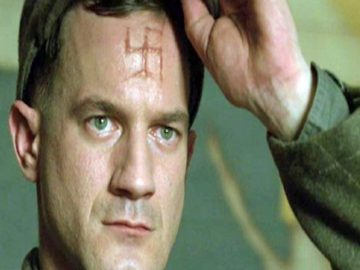

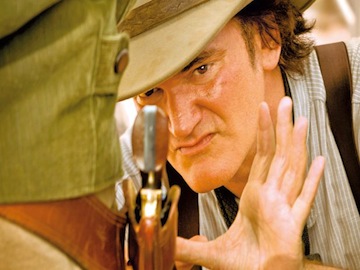
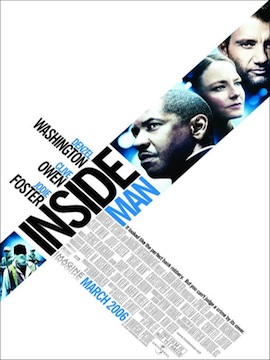
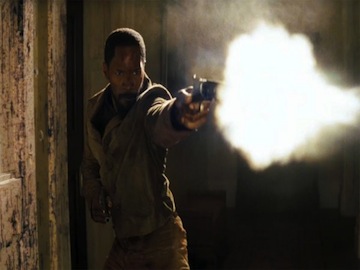
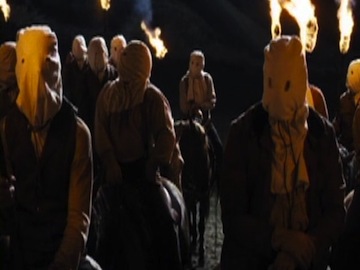


You go much deeper here than I think I am willing to go, though all your points spot-on and valid. I suppose I don’t go that deep because, obviously, white guilt and all that, but also because over-thinking it might be counterproductive (to me, I mean). There’s a visceral reaction I get from Tarantino movies, a “feel,” if you will, so much of his work a layer of slick and cool, and that isn’t to undermine what he does. I only mean that dissecting his work, which is the name of the game obviously, produces something (radically) from most. Because of his influences and homage being so prevalent, I think it’s easy to get distracted, bogged down in minutia, and thus missing the point. I don’t know. Anyway, terrific and insightful piece, Sam!
Hey there, Joe! Thank you for your thoughts! And yea, there is definitely a ‘felt experience’ quality to Tarantino’s films, something experiential. Maybe it has to do with his unabashed commitment to entertainment. He’s not trying to cram any set moral message down the audience’s throat. At the same time, a lot of people try and read deeper into what he’s doing than perhaps they should. Anyway, yea, I’m with you. Appreciate you dropping by.
I read this piece after seeing the movie and agree withe most of the analysis. After reading some of the criticism from the left on Django, I wasn’t too keen on seeing it, especially having to pay $$ to hear the n-word 115+ times. But my good friend and movie lover prevailed and we went yesterday to Emeryville, a town next door to Oakland (Significant. Hold on. I’ll tell you why).
I’m glad I saw it. I had a good time, laughing my ass off. From the opening scene of manacled slaves, chained together and stumbling through the woods, to the last, I recognized set pieces from blaxploitation movies and spaghetti westerns, impossible revenge killings, stereotypes getting their unstereotypical comeuppance, and the ketchup blood exploding like mini-volcanoes with each shooting. I recognized Tarantino’s trademark over quoting from the films he loved as a young film clerk. This is his style. I expected no less. What was unexpected was how funny and light-hearted it was. Being black, I was afraid I’d be tremendously offended. No such. Django Unchained was pure fantasy, a never-ever-even-conceived filmic apology for slavery from a filmmaker who’s made millions using the detritus, the flotsam and jetsam, the marginalized, the historically exploited. Why not slavery? A week before.9/11, Colin Powell, as Sec’y of State, refused to apologize for slavery at a world conference. This movie is the official apology, because it will reach the world still listening for the US to deal with its own legacy of terrorism.
As for seeing the movie in Emeryville, we sat in a racially-mixed audience. Many times, my friend and I laughed when the whites around us did not–at the n-word being used to purposely deflate it, at almost every Uncle Tom-ism, at most of the blood volcanoes which resembled detergent stain removal commercials, at the barber shaves and manicured necklines of some of the brothers (who must have told hair and make-up “I’ll be a slave but don’t touch the mustache”) , at the cameos which seemed like post career nods to character actors and stars of the 80/90s, and last but not least at the poor innocent white actors who had to serve as apology stand-ins for a whole race.
To those who want to complain about Hollywood, I repeat: film consortium, indie filmmaking, DIY. There are a host of alternatives. I saw “The Black Mixtapes” in Oakland at a forum, after which the black filmmakers head urged us all to support indie films at festivals and similar showings.
Judy–these comments are wonderful. Thank you for sharing them here. I actually also saw the film in Emeryville. At Bay Street 16! The crowd was diverse for sure–I was by myself, just dying to see it while the hype was still going. A lot of what you say resonates with me. Not with Django Unchained as much as with Inglorious Basterds. When Shoshana screams ‘This is the face of Jewish Rage!’ through the fire engulfing the theater, I just remember cracking up! All this while what I assumed were either a) non-Jews or b) Jews who didn’t like the film looked on in sober admiration.
Also, I’m with you about DIY. And hey, I love Hollywood! Sure, some of what they give us is crap. But there’s a whole lot of gold in there, too, and I can’t get enough.
“a sizeable and thoughtful percentage of the Jewish American community was offended by the film’s violence, revenge themes, and historical liberties. Though my feelings towards the film were mainly positive, the main argument I noticed being leveraged against it, as with Django, was that the history being represented belongs to those affected by it, and if you take it out of those peoples’ hands, you have the tendency to mess with cultural ownership.”
Sounds like a load of shite to me. What is this “cultural ownership”, why should anyone tread softly and respect it (especially if they have a good reason not to, such as having a clear idea of a movie you’d like to make), and what exactly is it that happens to anyone if we don’t?
A “sizeable percentage of the Jewish community” got offended. Okay. Well and a sizeable percentage didn’t. Also a lot of people who aren’t Jews got offended, on behalf of those who are… I guess it’s not just those within the culture that “owns” something that get offended, and whose being offended is frequently brought up by critics and has to be addressed by the creators. In both cases you have to deal with vocal of groups of people voicing offense – what difference does it *really* make who owns what, culturally?
Next question is, what exactly *is* this “offense”? Well, a lot of the time when you read about “the LGBT community voicing concerns” about a LGBT character, or the AA community about how black people are portrayed, or the Jewish community, or the Asian American community, or any other sort of subculture being vocally offended at something done a certain way in a movie, you look at what they’re actually saying, and it often tends to be fallacious, tone-deaf leftard nonsense relying on a severe lack of understanding of what humor and escapism are, as well as a literalist interpretation of depicted characters or situations somehow having implications for entire demographics and political situations.
A gay stereotype in a comedy movie – an outrage, we’re not like that at all! A CGI cartoon rabbit from a different planet being somewhat reminiscent of an old-fashioned black stereotype – well we’re not pleased at all with what this movie seems to feel about the AA community! A bunch of invalid, paranoid complaints that don’t deserve the time of anyone’s day no matter how much it’s “culturally owned” by whoever makes them – and it’s the same here.
Offended by the film’s violence and revenge? Well that’s good for them that they want to take the high ground and purge revenge from their thoughts – the rest of us wants to see some Nazi scalps, thank you very much if you don’t mind. Offended by the history alteration? In what way is someone making an escapist film featuring alternate history (that doesn’t in any way pretend or even SEEM to pretend to be accurate) an insult against anyone, let alone a demographic that isn’t portrayed unfairly or slandered or blamed for anything – and if it isn’t, what relevance is there to their “offense”?
“was that the history being represented belongs to those affected by it, and if you take it out of those peoples’ hands,”
Well, technically history belongs to unbiased (as well as diversely biased) historians and scientists; while writing escapist fiction that doesn’t pretend to be history belongs to, well, writers. And writing about Spain from the perspective of a Spaniard belongs to Spaniards, while writing about Spain from the perspective of a non-Spaniard belongs to non-Spaniards.
It’s that simple really – someone writes something about their in-group, and audiences gather to see what that dude has to say about his in-group; another writes something about an out-group (without claiming to speak for it), and then the audience knowingly gathers to watch this dude say whatever he says about that out-group he doesn’t belong to.
A historian publishes a work on history, and people go check it out with the understanding of looking at something that claims to be factual. Meanwhile, a writer slaps together an alternate scenario that didn’t happen (and, again, doesn’t claim it did), and consequently, people knowingly come to see a made-up scenario that didn’t happen.
Astrophycist states that FTL isn’t possible, and people make a footnote in their brains that FTL isn’t possible; director makes a fictional movie about people that travel FT, and the audience enjoys the fictional movie about people travelling FTL.
Socially conscious author writes a realistic, authentic novel about being gay in location/time/community x, people buy it to read an authentic portrayal of life as a gay in location/time/community x; somewhere else, a group of comedians shoot a sketch involving exaggerated gay stereotypes highlighting their skills with jokes, voice impressions and stereotype savviness, people see and laugh at those comedians playing out their sketch involving gay stereotypes that highlights their skills with jokes, voice impressions and stereotype savviness.
ALL that ever matters in this area, is how your work matches your claims about that work’s premise on the one hand, and the public’s (justified) perceptions of said premise on the other. This whole guilt-tripping, high-horse riding, finger-pointing practice of telling people which area they may or may not tread, how they should tread them, and what they should or shouldn’t do as they tread, is nothing but a giant waste of time – and it misses the point entirely.
In conclusion, the Jews don’t “own” their history, they only own their own perspective on it. Others may very well express their own.
The very fact that Tarantino is neither a Jew nor a Frenchman nor black already deprives his works of any “authenticity” that might be inherent to a writer belonging to any of those groups – he’s a white American guy, and anything he writes concerning events “affecting” those demographics, as well as characters FROM those demographics, is ultimately something that comes from his “outsider” perspective.
This automatic disclaimer is really all that’s needed to protect the “turf” of those demographics – additionally demanding said outsider to tread softly and jump through all kinds of hoops to do it “the right way”, is little more than a masturbatory indulgence – widely considered to be a noble moral duty by liberals everywhere ;)
“In fact, I’m a proponent of using immense caution when appropriating cultural narratives that are foreign to one’s own, especially if those narratives involve passing judgment upon those on the receiving end.”
Well, if it doesn’t then getting it wrong is really the worst thing that could happen there, isn’t it; and if it does, as in the movie is used as a medium to express such a judgment, then the problem really lies with the judgement itself doesn’t it? Doesn’t matter if you do it in a public statement or in a narrative – if you express an ignorant, problematic opinion, you’re gonna get judged for that. However, escapist works such as IB are there for thrills and entertainment, and thus don’t express any opinions – even if certain demographics are portrayed in a certain way (accurate or inaccurate), which I don’t think they are in IB ;)
“The right’s reaction to Django Unchained, for instance, was particularly telling, being that they couldn’t overlook the hyperbolic, a-thematic nature of the film, construing it instead as a call for black libel against Christian whites.”
Well, just when you’re about to forget that the conservatives are are the same kind of fags as their counterparts… they’ll always generously do something to remind you. Isn’t that nice of them :D
“From the start the audience around me laughed, quite heartily. What was disconcerting was how often they laughed at the wrong times. Some of the laughter was nervous tittering during the first instances when the N-word was bandied about. They laughed when Stephen asked Calvin Candie if he was going to let ‘that nigger,’ Django, sleep in the master’s house. They laughed when Django told King Schultz people were staring because, ‘they ain’t never seen a nigger on no horse.’ The more the word was used, the funnier it seemed to become for the audience.”
So? I laughed at those parts, too; they were funny. Gratuitous use of “nigger” is funny (about in the same vein as gratuitous cursing is funny, except with an additional flavor of political incorrectness), and all of those lines were well-writen/acted and almost certainly intended as comedy (obviously with a bit of serious to it). Just because it’s a bunch of hicks or whatever doesn’t mean *they* did the same thing in a racist way – but then again, I’ve never been there so who knows :d
“Many Jews don’t want to be seen as having a lust for blood, especially with the situation in the Middle East”
Worth considering maybe, but the question is for how long. Some Jews do have a lust for blood – and the titular IBs (whose Southerness, closely followed by Aldo’s Native ancestry, is a much more prominent feature than them being Jews) just so happen to be among them.
And the Middle East is a different situation entirely; it’s easy to see where this line of thinking ends up leading to – a distinct group of characters “represent” an entire demographic, and that demographic a century ago represents said demographic today… so tread carefully when writing those individual characters and organizations that don’t in any way stand for the entire demographic they belong to! Hard to see why a director would wanna disregard all of that and just make his movie :)
“It’s safe to bet that if a Jew had directed Inglorious Basterds it would have caused a much greater uproar in both the Jewish community and the film going community at large.”
Well, for the same retarded reasons as the uproar about Tarantino, I would say :d
Conservatards would’ve howled louder, leftards planted more semen in the earth; the more things changed, the more they’d stay the same…
As to your thesis that Jewish/black people somehow wouldn’t be “able” to handle the nuances, I call bullshit on that. The tasty (meta) hints aside, Tarantino already disposed with those “nuances” by portraying every German soldier as basically deserving what’s coming to them – how would a “traumatized Jew” be supposed to top that?
Besides, calling modern middle-class Jews/blacks “traumatized” is as preposterous as it is patronizing – I’m pretty sure all those people living out their very decent lives in the middle or upper class appreciate being told how furious and traumatized they all are. Don’t forget: every black person and every Jew is a social activist. They really, really care a lot about “their” history, and it’s not like a whole lot of them are just normal, modern people who mainly care about themselves and their close friends and all get Fs in history and social sciences. It’s not like Hollywood is filled with (ethnic) Jews who you might occasionally be surprised to learn are actually Jews given how… normal… and neutral… their output is. A Jewish director being willing and/or capable to shoot a movie like this with any… nuance? Yea, totally not gonna happen :O
All joking aside, really the only problem someone like that might’ve faced would be the desire to avoid being seen as / feeling like self-indulgent fanfic writers about themselves winning the universe and getting back at everyone that wronged them. But, you knoe, many people don’t really have problems with that kind of thing, and besides, humour and irony go a long way as we’ve seen in IB ;)
Those few bits aside, I completely agree with this article. Well said! :)